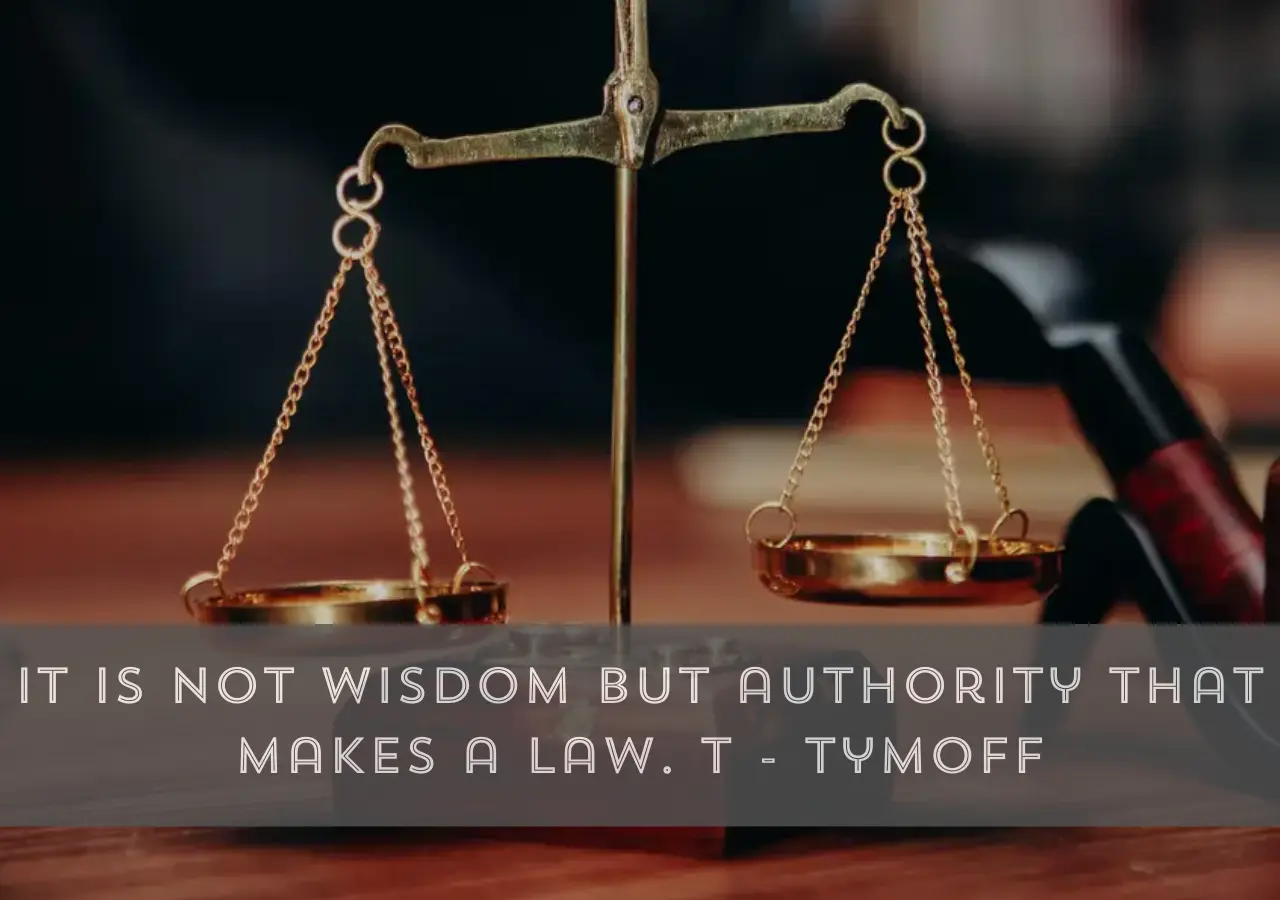The statement, “It is not wisdom but authority that makes a law. T – Tymoff”, raises important questions about the nature of laws and the source of their legitimacy. This quote invites us to contemplate whether laws are primarily established based on wisdom, which implies a rational and just foundation, or if they are imposed through authority, which suggests a hierarchical or coercive process. Let’s delve into the implications of this statement and its relevance in discussions about law and governance.
The Role of Wisdom in Lawmaking
The idea that wisdom should be a fundamental factor in lawmaking aligns with the concept of just and equitable governance. Wisdom in this context implies a deep understanding of societal needs, values, and ethical principles. Laws crafted with wisdom are often seen as fair, just, and capable of promoting the common good.

Historically, many philosophers and legal scholars have argued that laws should reflect not only the will of those in authority but also the collective wisdom and moral principles of society. In this view, the legislative process should involve careful consideration, debate, and analysis to ensure that laws are just and reasonable.
Authority and Law Enforcement
On the other hand, the role of authority in making and enforcing laws (It is not wisdom but authority that makes a law. T – Tymoff) cannot be ignored. Laws are established by governments and legislatures, and they possess the authority to enforce these laws through law enforcement agencies. Authority ensures that laws are adhered to and that consequences are imposed on those who violate them. This is essential for maintaining order and preventing chaos in society.
However, the quote by T. Tymoff suggests that authority alone, without the underpinning of wisdom and fairness, can lead to the imposition of unjust or oppressive laws. When laws (It is not wisdom but authority that makes a law. T – Tymoff) are enacted solely based on the whims of those in power, they may not serve the best interests of the people they govern.
The Balance Between Wisdom and Authority
Ideally, the creation and enforcement of laws should strike a balance between wisdom and authority. A just legal system is one in which authority is exercised with wisdom, empathy, and a commitment to the well-being of the populace. This requires checks and balances, transparency, and mechanisms for accountability to ensure that laws reflect the collective wisdom and values of society.
In democratic societies, the input of elected representatives, legal experts, and the public is essential in shaping legislation. This participatory approach aims to prevent the arbitrary exercise of authority and promote laws (It is not wisdom but authority that makes a law. T – Tymoff) that are based on informed decisions and societal consensus.
The Implications of T. Tymoff’s Quote
T. Tymoff’s quote highlights the tension between wisdom and authority in the lawmaking process. It serves as a reminder that laws should not be based solely on the power of those in authority, but rather on a deep understanding of the needs and values of society.
In practice, this means that lawmakers should engage in open and transparent decision-making processes, involving diverse perspectives and expertise. It also means that citizens should be encouraged to participate in the democratic process, holding their elected representatives accountable for the laws (It is not wisdom but authority that makes a law. T – Tymoff) they enact.
Conclusion: It is not wisdom but authority that makes a law. T – Tymoff
In conclusion, T. Tymoff’s quote, “It is not wisdom but authority that makes a law. T – Tymoff,” serves as a timely reminder of the importance of balancing wisdom and authority in the lawmaking process. By recognizing the limitations of authority and the importance of wisdom, we can work towards creating a more just and equitable legal system that serves the needs of all members of society.
Ultimately, the legitimacy of laws depends on their ability to reflect the collective wisdom and values of society. When laws are crafted with wisdom and fairness, they are more likely to promote the common good and ensure the well-being of all citizens. As we move forward, it is essential that we prioritize wisdom and empathy in the lawmaking process, rather than relying solely on authority and power.
FAQs
Q: What does T. Tymoff’s quote mean?
A: T. Tymoff’s quote suggests that laws are often based on authority rather than wisdom, and that this can lead to unjust or oppressive laws.
Q: What is the role of wisdom in lawmaking?
A: Wisdom is essential in lawmaking as it implies a deep understanding of societal needs, values, and ethical principles.
Q: Why is authority important in law enforcement?
A: Authority is necessary for maintaining order and preventing chaos in society, but it should be exercised with wisdom and empathy.
Q: How can we balance wisdom and authority in lawmaking?
A: By engaging in open and transparent decision-making processes, involving diverse perspectives and expertise, and encouraging citizen participation in the democratic process.

